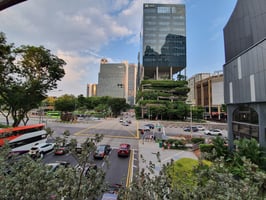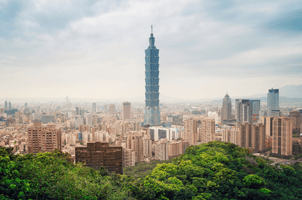China’s big GDP miss in Q2 may be the bad news needed to spur more policy support 15-July-2022 The...
Kusu News 23-Feb-2022
How China's cybersecurity laws could backfire
Chinese legislation seeking data from cars on drivers, roads they travel, faces they pass, could scare investors away from its auto industry
14-Feb-2022 Japantimes
The next target for China’s cybersecurity crackdown will be the pools of data collected by the latest generation of cars. This approach risks Beijing shooting itself in the foot, and jeopardizing its ambitious plans to lead the global race for electric and autonomous vehicles.
China wants to have control over the information cars have about their drivers, the roads they traverse and the faces and voices they pass, according to a draft law on data-security management for the automotive industry first issued in May. It seeks to ensure manufacturers across the auto supply chain keep data in the country and pass a government security evaluation if it’s sent overseas.
Operators that process personal information of more than 100,000 individuals, or what preliminary rules have broadly defined as “important data,” are required to report it to regulators, provincial governments and a host of other official bodies. The rules apply to almost every situation in which people find themselves in or near a car, creating a host of ambiguities.
China’s move to protect privacy and put boundaries around data makes sense. However, in the current form, the rules do more to restrict innovation, creating an enormous burden on companies for the sake of regulation and undermining the progress Beijing — and global firms operating in the world’s largest auto market — have made within the industry.
Singapore and Indonesia have signed a ‘balanced’ set of agreements that addresses 3 longstanding issues: PM Lee
25-Jan-2022 CNA
BINTAN: Singapore and Indonesia have signed a “balanced” set of agreements that addresses the “longstanding” bilateral issues of Flight Information Region (FIR), defence cooperation and extradition of fugitives, Prime Minister Lee Hsien Loong said on Tuesday (Jan 25).
Speaking during a joint press conference with Indonesian President Joko Widodo at the 5th Singapore-Indonesia Leader’s Retreat, Mr Lee said these three issues are important to both sides.
“They have been on our bilateral agenda for several decades. We have worked together and discussed them many times before,” Mr Lee said.
The two leaders had earlier witnessed the signing of the agreements at the Sanchaya resort in Bintan.
Mr Lee said that at the previous Leaders’ Retreat in October 2019, Mr Widodo and he had decided that “it was time to decisively settle these longstanding bilateral issues”.
Indonesia urges G20 collaboration as Ukraine crisis overshadows gathering
17-Feb-2022 Investing.com
JAKARTA/TOKYO (Reuters) -The crisis in Ukraine overshadowed a gathering of finance leaders from the world's top 20 economies that kicked off on Thursday, with host Indonesia's president warning "now is not the time" to create new risks to a fragile global recovery.
Russia's military presence at Ukraine's borders have led to one of the deepest crises in East-West relations for decades, jolting financial markets and adding to the headwinds facing a global economy still emerging from the COVID-19 pandemic.
Geopolitical risks and the economic fallout from the pandemic will likely be among key topics of debate at the G20 finance leaders' meeting, as well as rising global inflation and tighter monetary policy in some regions.
Joko Widodo, president of host country Indonesia, urged G20 nations to focus on collaboration to revive a global economy that is "still shaken" from the pandemic.
"In a situation like now, it is not the time for rivalry," he said in opening remarks at the G20 meeting, which many ministers are attending online due to the pandemic.
"It is not the time to create a new tension that disrupts the global recovery, especially one that endangers the safety of the world like what is happening in Ukraine now."
Xi Jinping Orders Hong Kong to Get a Grip on Spiraling Covid-19 Outbreak
Omicron surge swamps hospitals and testing centers, foreshadowing greater intervention from Beijing
16-Feb-2022 WSJ
Chinese leader Xi Jinping told Hong Kong’s government to control a spiraling Covid-19 outbreak that has overwhelmed the city’s healthcare system, highlighting Beijing’s growing concerns over the crisis while raising the likelihood of even tighter restrictions in the global financial hub.
Mr. Xi conveyed the directive in articles in the city’s two main state-owned newspapers. Hong Kong’s control of the epidemic was “the overriding task at present,” he said, adding that it was the responsibility of local officials to get the outbreak under control.
He said mainland authorities would support Hong Kong’s virus-testing capacity, which city officials have said can’t keep up with the surge in infections. The central government would also step in to ease shortages of food and other supplies, as well as help build treatment and isolation centers, Mr. Xi said.
Southeast Asian Elite Survey Paints Complex Picture of China Ties
The ISEAS-Yusof Ishak Institute’s latest State of Southeast Asia survey reflects the region’s fraught and ambivalent view of China’s rising power.
17-Feb-2022 The Diplomat
Yesterday, Singapore’s ISEAS-Yusof Ishak Institute published its annual State of Southeast Asia survey report, which offers a regular and much-anticipated gauge of elite opinion on key issues of regional and global import. This year’s survey, based on interviews with 1,677 policymakers, journalists, businesspeople, and pundits from the 10 countries of the Association of Southeast Asian Nations (ASEAN), was no exception.
There is a lot to dig into in this year’s survey, from regional views of the Mekong River to perceptions about the efficacy of ASEAN, but among the most striking is the insights it offers into how Southeast Asian elites view the growing power of China, and its unfolding strategic competition with the United States.
In broad terms, the 2022 survey report replicates the broad findings of the past several years, which have highlighted the region’s acknowledgement but growing disquiet about China’s waxing economic, political, and strategic clout. In this year’s survey, 76.7 percent of respondents agreed that China was the most influential economic power in Southeast Asia, up from 75.9 percent last year. Meanwhile, 54.4 percent rated it the most influential political and strategic power, up from 49.8 percent in 2021. On both these counts, China led the U.S., Japan, and other nations by a considerable margin.
But while China’s growth has left an impression on Southeast Asian elites, it hasn’t elicited much trust. The survey report found that the most trusted major power in Southeast Asia was Japan, which commanded an overall confidence level of 54.2 percent, even though this number declined significantly from 68.2 percent in 2021, followed closely by the U.S., in which 52.8 percent of respondents expressed confidence.
The figures for China were nearly the opposite. A majority of respondents (58.1 percent) expressed either “little confidence” (33.3 percent) or “no confidence” (24.8 percent) in China to “do the right thing” to contribute to global peace, security, prosperity and governance. Of those who expressed distrust towards China, 49.6 percent expressed fear that China could use economic and military power to threaten their country’s interests and sovereignty. Nearly a quarter said that they did not consider China “a responsible or reliable power.”
-1.jpg?width=146&height=50&name=Kusu%20(1)-1.jpg)


